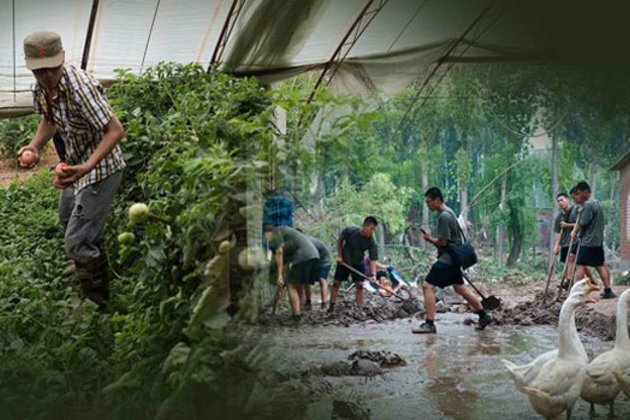China's Mass Rural Youth Volunteer Program Aims to Avoid Unrest
RFA
16 Apr 2019, 00:12 GMT+10

Plans outlined by the ruling Chinese Communist Partys youth wing to send millions of young people to rural areas on volunteering assignments and as entrepreneurs have been widely compared to late supreme leader Mao Zedongs mass mobilization of urban youth during the Cultural Revolution.
China is planning to mobilize more than 10 million young people in its cities, in a bid to reverse a brain drain from the countryside, state media reported on Friday.
The move, announced earlier this month by the Communist Youth League, is aimed at boosting cultural, technological and medical development in rural areas by 2020.
These young volunteers will be sent to rural areas, especially old revolutionary base areas, regions of extreme poverty and areas where ethnic minority groups live to promote local development and improve personal skills, the Global Times newspaper quoted the Communist Youth League as saying in a recent document.
The move was hailed by many local officials, who said that it would help revitalize rural areas in the country that have been suffering from talent and labor outflows, the paper said.
While it is still unclear whether the program will result in a mass, mandatory mobilization of young people, political commentators told RFA that there are clear economic parallels with Maos Down to the Countryside movement of the late 1960s to early 1970s.
U.S.-based political commentator Wu Jianmin said the recent economic slowdown in China and the U.S.-China trade war have boosted unemployment among young people, including university graduates, with huge potential for social unrest.
"The Central Committee of the Communist Youth League has said that this Down to the Countryside [decision] was based on the overall situation of the Chinese economy, Wu said.
If you have large numbers of young people accumulating in the cities, and if they have no employment opportunities and go online every day, this will trigger dissatisfaction with the government, Wu said.
The authorities are worried that there will be various protests against the government in the cities," he said.
Unlikely to be mandatory
According to Wu, the current program is unlikely to be completely mandatory, however, unlike the Down to the Countryside movement initiated by Mao.
Back in the day, the Down to the Countryside movement was totally compulsory, he said. When Mao Zedong decreed it, every eligible young person in every family had to do, whether they liked it or not.
Nowadays, the government will be dressing it up and selling it to them, so this policy is actually much more deceptive than the previous one, Wu said.
The proposals outlined by the League target three areas: encouraging educated young people to go back to their rural hometowns to revitalize local economies by starting businesses; encouraging talented Chinese overseas to come back to China; and mobilizing educated young people to begin new lives in rural areas and boost those areas pool of human capital.
Zhang Weimin, a former urban youth sent down to the countryside during the Mao era, said that her generation never fully recovered from the experience.
Those who were sent away often lost access to government benefits such as retirement and healthcare on their return, and they are still struggling to defend their rights, decades later. She said the younger generation today is unlikely to be attracted by the idea.
I think that if they only go for two years training in rural areas, then maybe some people would be willing to do it, Zhang said. But if it was an indefinite arrangement, as it was for us back then, [they wont].
If you were to ask them what they want to do next, I dont think a single person will tell you that they want to go to the countryside, she said.
Incentives offered
According to the League document, the government will provide incentives for e-commerce entrepreneurship in rural areas and training for returning entrepreneurs, and will publicize any success stories, in a bid to attract participants.
The document also outlines plans to send 10,000 student members of the Communist Party of China and the Youth League to serve in rural areas as part-time officials, to train them in rural governance.
It also proposes building training centers in rural areas targeting more than 200,000 young people by 2020, the Global Times said.
But Chen Kuide, executive chairman of the Princeton China Society, said the government will find the plans much harder to implement than Mao did.
"It is definitely much harder to carry out this kind of mass mobilization nowadays, Chen told RFA. If the government can't provide these young people with definite benefits, it will be difficult for it to impose its will to the extent that it did during the Cultural Revolution.
Instead, this plan could turn into one of those policies that is imposed from above, but resisted from below, he said.
According to official statistics, more than 14 million Chinese youth were sent into rural areas during the Cultural Revolution (1966-1976).
The Global Times said the plan is the latest in a raft of policies in recent years to help rural areas attract skilled labor.
Reported by Jia Ao for RFAs Mandarin Service, and by Wen Yuqing for the Cantonese Service. Translated and edited by Luisetta Mudie.
Copyright 1998-2018, RFA. Published with the permission of Radio Free Asia, 2025 M St. NW, Suite 300, Washington DC 20036
 Share
Share
 Tweet
Tweet
 Share
Share
 Flip
Flip
 Email
Email
Watch latest videos
Subscribe and Follow
Get a daily dose of Caribbean Herald news through our daily email, its complimentary and keeps you fully up to date with world and business news as well.
News RELEASES
Publish news of your business, community or sports group, personnel appointments, major event and more by submitting a news release to Caribbean Herald.
More InformationBusiness
SectionBitcoin soars to a record on Trump policies, institutional demand
NEW YORK CITY, New York: Bitcoin surged to a new all-time high this week, buoyed by growing institutional interest and a wave of pro-crypto...
Huawei eyes new buyers for AI chips amid U.S. export curbs
SHENZHEN, China: As global chip competition intensifies, Huawei Technologies is exploring new markets in the Middle East and Southeast...
U.S. food prices at risk as Brazil tariff hits key imports
LONDON/NEW YORK CITY: American grocery bills may be headed higher as coffee and orange juice prices face upward pressure from new tariffs...
WK Kellogg sold to Ferrero as food giants chase shelf power
BATTLE CREEK, Michigan: In a major consolidation of iconic food brands, WK Kellogg has agreed to be acquired by the owner of Ferrero...
Filmmaker joins biotech effort to bring back extinct giant bird
WASHINGTON, D.C.: Filmmaker Peter Jackson's lifelong fascination with the extinct giant New Zealand flightless bird called the moa...
India seeks WTO nod for retaliatory tariffs on US
NEW DELHI, India: India has submitted a revised proposal to the World Trade Organization (WTO) in Geneva to implement retaliatory tariffs...
Latin America
SectionU.S. food prices at risk as Brazil tariff hits key imports
LONDON/NEW YORK CITY: American grocery bills may be headed higher as coffee and orange juice prices face upward pressure from new tariffs...
Crew extend D Andres Herrera's loan through June 2026
(Photo credit: Adam Cairns/USA TODAY Network via Imagn Images) The Columbus Crew extended defender Andres Herrera's loan from Argentina's...
He's got big future, not going to be the last he plays for Australia: Boland backs Konstas after shambolic WI tour
Kingston [Jamaica], July 14 (ANI): Australia's seasoned speedster Scott Boland still sees a 'big future' for teenage Sam Konstas despite...
2026 FIFA World Cup expansion will have a big climate footprint, with matches from Mexico to Canada - here's what fans can do
When the FIFA World Cup hits North America in June 2026, 48 teams and millions of sports fans will be traveling among venues spread...
Trump's Brazil tariffs point more to his enduring bond with far-right Bolsonaro than economic concerns
After much back-and-forth over several months, President Donald Trump announced on July 9, 2025, that he planned to levy a 50% tariff...
(SP)U.S.-NEW JERSEY-FOOTBALL-FIFA CLUB WORLD CUP-FINAL-CHELSEA FC VS PARIS SAINT-GERMAIN
(250714) -- NEW JERSEY, July 14, 2025 (Xinhua) -- Cole Palmer (L) of Chelsea FC celebrates scoring with teammate Joao Pedro during...












